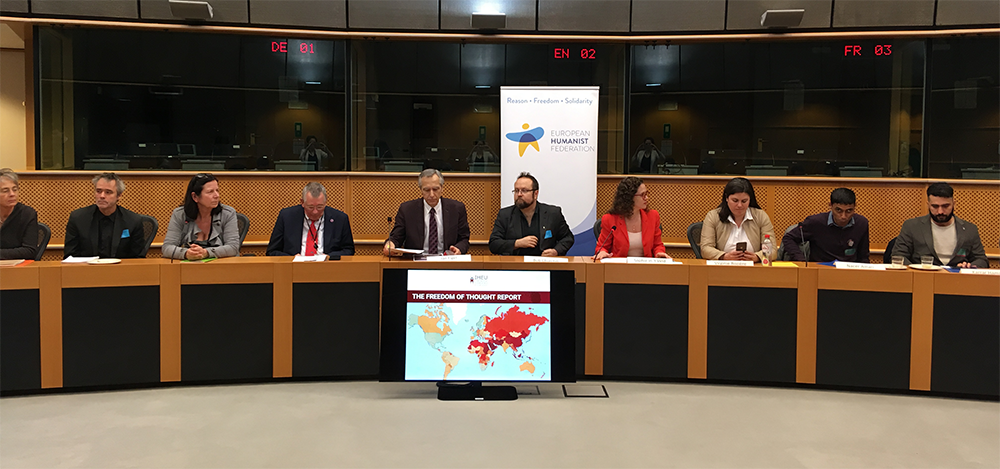
The Freedom of Thought Report 2018 has been welcomed in Brussels by Members of the European Parliament.
The report published by the International Humanist and Ethical Union (IHEU) documents legal discrimination and forms of persecution faced by humanists, atheists and other non-religious people around the world.
In Thursday’s event organized by the European Humanist Federation, the Report’s editor Bob Churchill introduced the 2018 edition. He emphasized how the suppression of “humanist values” factors in the Report, and how laws against ‘apostasy’ and ‘blasphemy’ directly limit the freedoms of thought and expression for non-religious individuals.
The report was welcomed by the event’s hosts: MEPs Sophie In’t Veld and Virginie Rozière, both members of the European Parliament Platform for Secularism in Politics, as well as by Dennis de Jong, chair of the European Parliament Intergroup on Freedom of Religion or Belief. Virginie Rozière said: “In 2018, year of the 70th anniversary of the Universal Declaration of Human Rights, there are still untold millions of humanists, atheists and otherwise religiously unaffiliated people living in countries where they are subject to a double persecution. The one coming from state but also the one emanating from an entire society. This report is of a great importance because it details discriminations, which are too regularly ignored or minimized by religious representatives but also by the politicians who have their attention. … Atheism and the non-religious population are growing rapidly. Still, non-religious face battles against religious privilege and inequalities whether these inequalities are subtle or not.”
Ján Figeľ, Special Envoy for the promotion of freedom of religion or belief (FoRB) outside the EU, reminded the audience that Freedom of Religion or Belief includes the freedom not to believe, or to change religion. He argued that the strength or weakness of freedom of religion or belief in a country was a test for other rights and democratic values. Welcoming the Report’s inclusion of a “top 10” best-performing countries he also argued that it was important to recognize best practices and respect for FoRB where it existed.
Two atheist activists on the panel were also invited to provide their own testimonies as victims of persecution by Islamist extremists. Karrar Hamza Al Asfoor, an Iraqi atheist activist who manages one of the largest atheist Facebook groups of his country, described how he had had doubts about religion from childhood. He explained the social impact of renouncing religion later in life, and how he became a known activist managing large social media pages for atheist, feminist and pro-LGBT causes in Iraq. Even after having fled to Greece, he is still struggling against Islamist attempts to shut down his atheist Facebook groups. He explained how many social media activists face a continual threat of being taken offline by armies of fake accounts misreporting their content as problematic.
The room then heard from Nacer Amari, a Tunisian human rights activist and co-Founder of Prometheus Europe. Mr. Amari explained that despite a reputation as a secularized Muslim nation, Tunisia still faces numerous issues – as illustrated in the Freedom of Thought Report – including a blasphemy law, state religion, and religious restrictions on holding public office.
The panel was concluded by Giulio Ercolessi, president of the European Humanist Federation, who called out the populist and extremist narrative under which immigrants are uniformly painted as being ‘different’ or contradicting European values. On the contrary, he emphasized that many who come to Europe appreciate open societies, civic values and rule of law more than populist politicians.
The IHEU Freedom of Thought Report can be red for free at freethoughtreport.com.